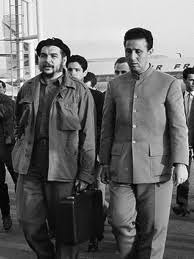
Algerian leader Ben Bella and Cuban revolutionary Che Guevara during the early 1960s. Ben Bella recently died in Algeria at the age of 95., a photo by Pan-African News Wire File Photos on Flickr.
Havana October 4, 2012
More than 5,000 Cubans working in Africa
Granma International
MORE than 5,000 Cubans are currently working in Africa, a continent advocating greater cooperation with the island, according to the recent 4th African Regional Conference in Solidarity with Cuba.
Cuba is collaborating in the sectors of public health, medicine, education, agriculture, infrastructural works and vaccines, stated Clara Pulido, the Cuban ambassador to Ethiopia, during the event held in Adis Ababa.
"We have a shared history and must fight for a common objective," affirmed Pulido, who also announced that the Cuban Pharmaceutical Laboratory Enterprise Group (Labiofam) is to transfer technologies for African regional development.
The company is currently working on projects to eradicate malaria and promote agriculture on the continent, she added.
Cuban cooperation in Africa includes developing the Yo si puedo (Yes, I Can) literacy program.
Addressing the plenary session, the Cuban ambassador gave a broad overview of cooperation with the region and confirmed that there are many possibilities in biotechnology, trade and investment.
At this stage, what is required is to invigorate relations, share technologies, for which there is a need to continue this dialogue and strengthen the association with Cuba, from which country more than 40,000 African professionals and technical personnel have graduated in diverse specialties.
According to Miriam Morales, from the Communist Party of Cuba’s International Relations Department, many of these graduates are playing outstanding roles in their respective countries and societies.
Referring to the work of students trained in Cuba, Morales commented that the African diplomatic corps in her country includes accredited officials who studied on the island.
Currently, Cuba has cooperative relations with 51 of the 54 countries on the African continent.
More than 100 delegates from 27 nations participated in the conference, which took place in the headquarters of the African Union in Ethiopia. They condemned the U.S. blockade of Cuba and demanded the liberation of the five Cuban anti-terrorists incarcerated in that country.
Antonio Guerrero, Fernando González, Ramón Labañino, Gerardo Hernández and René González were detained on September 12, 1998 in Miami for alerting their country to acts of violence being plotted by anti-Cuban groups there.
The first solidarity encounter of this kind took place in South Africa in October 1995, with representatives from 12 countries, including figures such as Nelson Mandela, President at that time.
In the second, which took place in Ghana two years later, 415 delegates from 17 countries were present.
The third meeting was in Luanda, Angola, in 2010, attended by delegates from 18 nations and a number of figures, including Sam Nujoma, the founding father of Namibia.
No comments:
Post a Comment